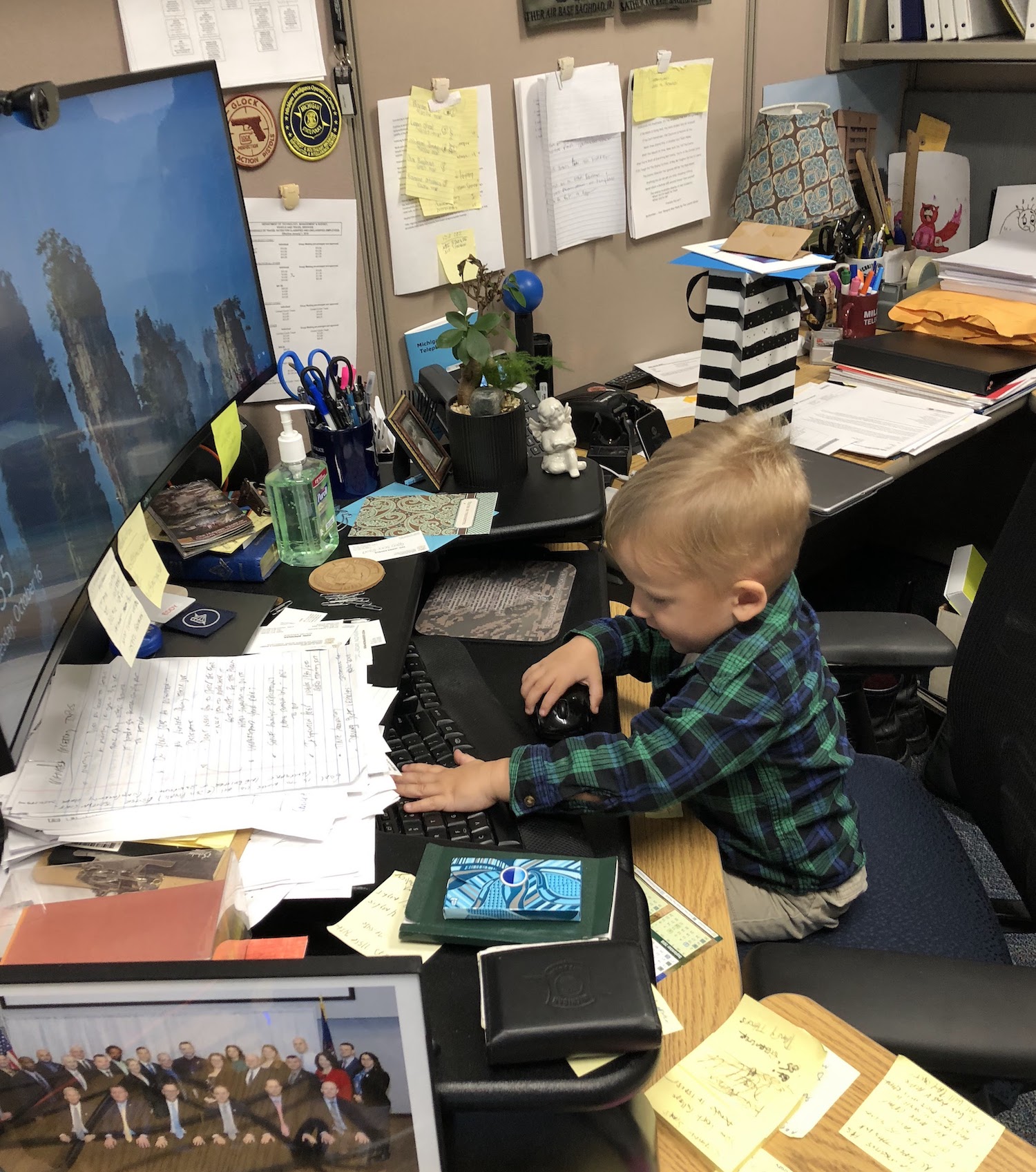


Happy Halloween!

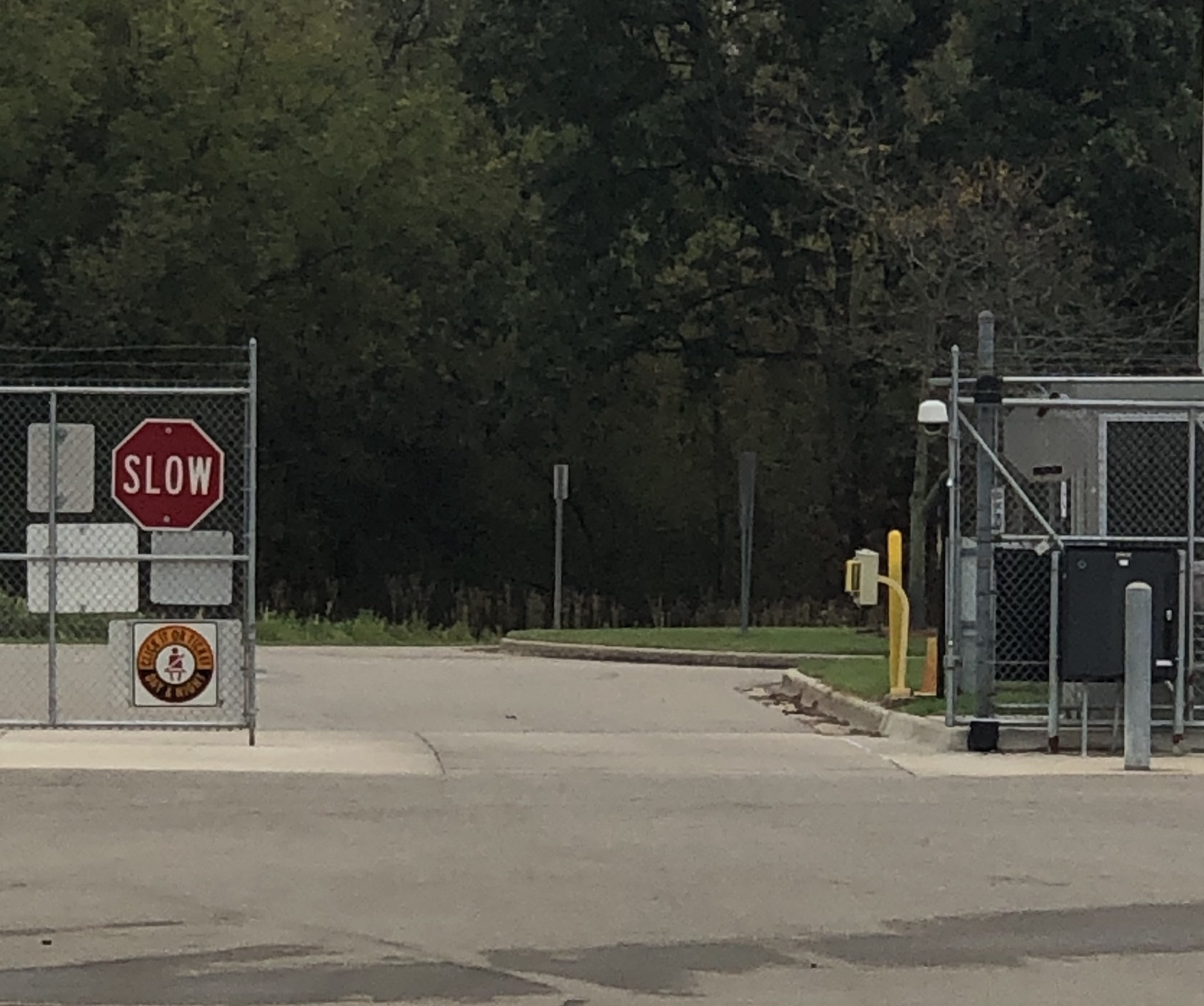
Slow Down
A few weeks ago I was having another day like every other day, week, and month: over-committed, behind schedule, scrambling from obligation to obligation, place to place, event to event. Like many other days, I had to squeeze in a stop at vehicle services. As usual, Bruce was there at the gate shack under his signature flat cap. No doubt retired and working to stay busy, this dude is old-school cool.
Bruce has seen me roll through dozens of times. And while he’s often quick to compliment my tie or choice of suit, sometimes he delivers a nugget of wisdom that only someone who’s been around a while can.
On this day, he picked up on something that prompted him to ask, “How things been treating you? Busy?” I’m certain he had me figured out long ago as just another over-tasked lunatic trying to keep an impossible schedule.
I told him I was busier than I wish, but things could always be worse. Enter the wisdom of Bruce.
“You know what you gotta do, don’t you?”
“What’s that?” I ask.
“Just slow down. Trust me, it’ll still get done…you’ll still get there.”
It’s interesting, if not uncanny, that I happen to be reading a book by Eric Weiner called ‘The Socrates Express’. It’s Weiner’s compilation of life lessons from his study of various philosophers. Throughout the text, philosophers and philosophy itself seem to be telling us to slow down. In fact, Weiner suggests perhaps it would be better for us to greet one another by saying “Take your time” or “Slow down.” instead of more traditional greetings. He says by doing this often enough, “…we might actually decelerate.”
Maybe Bruce read the same book.
While it’s true that patience is a fruit of the spirit and applies in many contexts, it certainly plays large into slowing down – especially when considered in relation to other spiritual fruits like love, gentleness, and self-control. A fair amount of research links patience with healthier, happier people who are more rational and resilient, too.
Slowing down also makes us better listeners. I know, because I can be a terrible listener, especially when I’m in a hurry. I hate that about myself, and Bruce’s timely advice pierced right to the heart of the issue.
But speed is relative, and like other life skills, one must find proper balance. Take for instance recent events of a return trip from Florida. Where taking things slow, combined with an unpleasant desk clerk and an unreasonable supervisor, resulted in one-third of our party unable to make the same flight as the other two-thirds. Add in a necessary car-key exchange, boarding door closure imminent, holder of said key on the wrong side of security, and an ill-timed ‘random security screening’ ordered while trying to get said key to the other side, and it’s a small miracle I am not on a watch list somewhere.

Deep, cleansing breath.
A week after sharing the video preview of this article, I was camping in northern Michigan and posted a picture of my deceleration efforts. I captioned it “Slowing down takes time.” I don’t know if that’s considered a double entendre, zeugma, syllepsis, or what..but it is both literally and figuratively true. I admire people who have mastered the art of chill…but I’m not so good at it.
This is not a unique problem. Country superstar band Alabama once recorded a song I could sing in my head every day and it would be true each time: ‘I’m in a Hurry (And Don’t Know Why)’. The chorus repeats the all-too-blatant main point:
I’m in a hurry to get things done
Oh, I rush and rush until life’s no fun
All I really gotta do is live and die
But I’m in a hurry and don’t know why
It sounds like a children’s book.
Like a child, I have a low threshold for boredom. I also have trouble saying “No” and many things that interest me. So I take on more than I should. Then I have too much to do in too little time. So I’m rushed. And maybe I’m afraid of NOT being busy because I know my mind’s tendency to wander. Not just toward less-than-wholesome contemplations, but to things I have seen, done, and experienced I don’t want to go back to.
After leaving Bruce, I put his advice to work. I drove slower back to my office. I took time to look around. When I started the long walk to the building, I was speed-walking, as usual. I breathed deeper and purposefully slowed my gait, instantly feeling the perpetual tension in my body release. I sought to maintain that peaceful, easy feeling the rest of the day.
It didn’t last long, but it was progress. And I am more aware now when I am rushing unnecessarily, and try harder to avoid spinning out of control.
Especially when TSA is about to flip the ‘randomly check this dude every time he travels’ switch.
Slow down and take it easy. And while you’re at it, keep doing great things!
Get Strong. Be Strong. Stay Strong.
I’m in a Hurry (And Don’t Know Why) lyrics © Reservoir 416, Murrah Music Corp. Songwriters: Roger Murrah / Randy Van Warmer. Source: Musixmatch
Weiner, Eric (2020). The socrates express. New York, NY: Avid Reader Press.
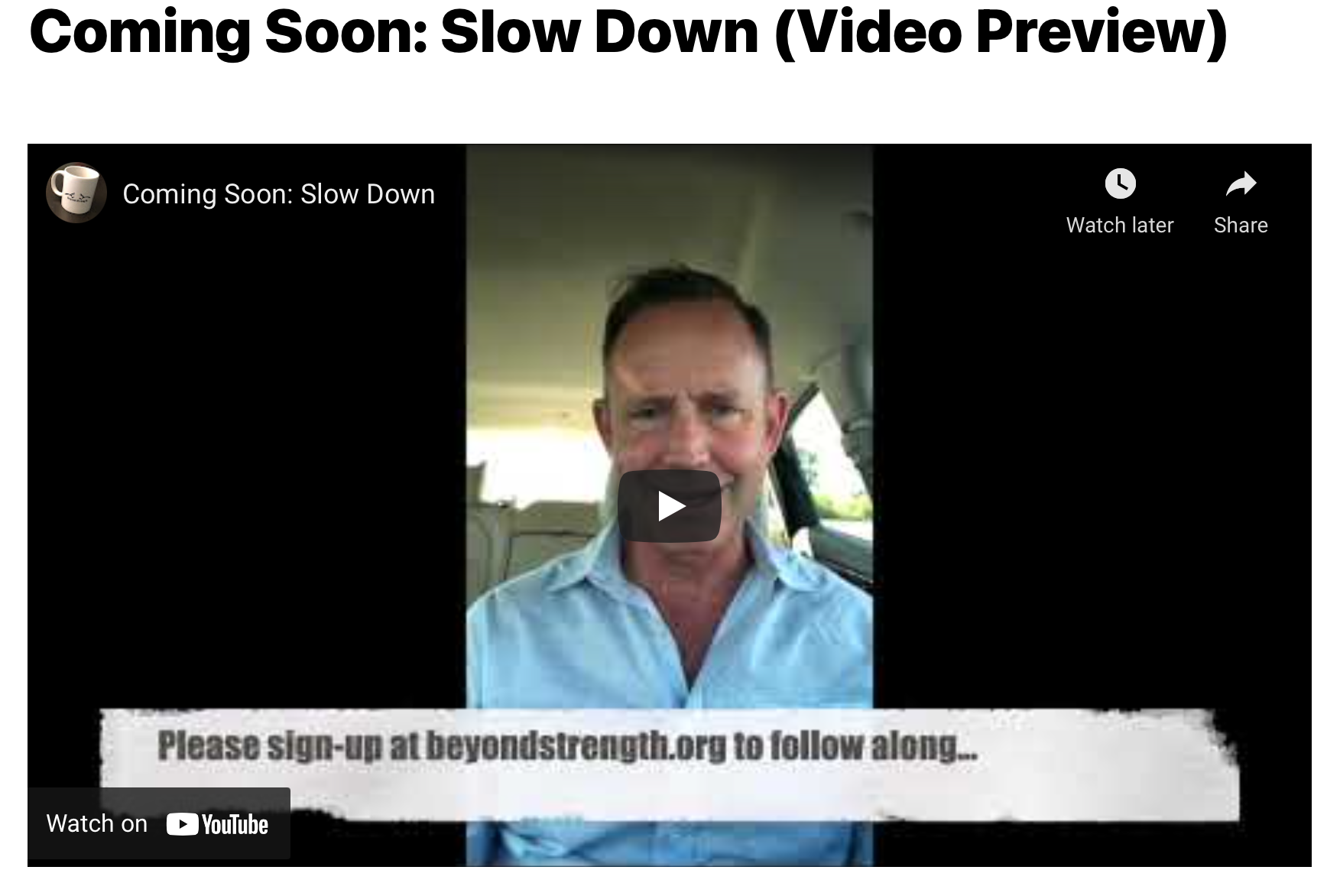
Coming Soon: Slow Down
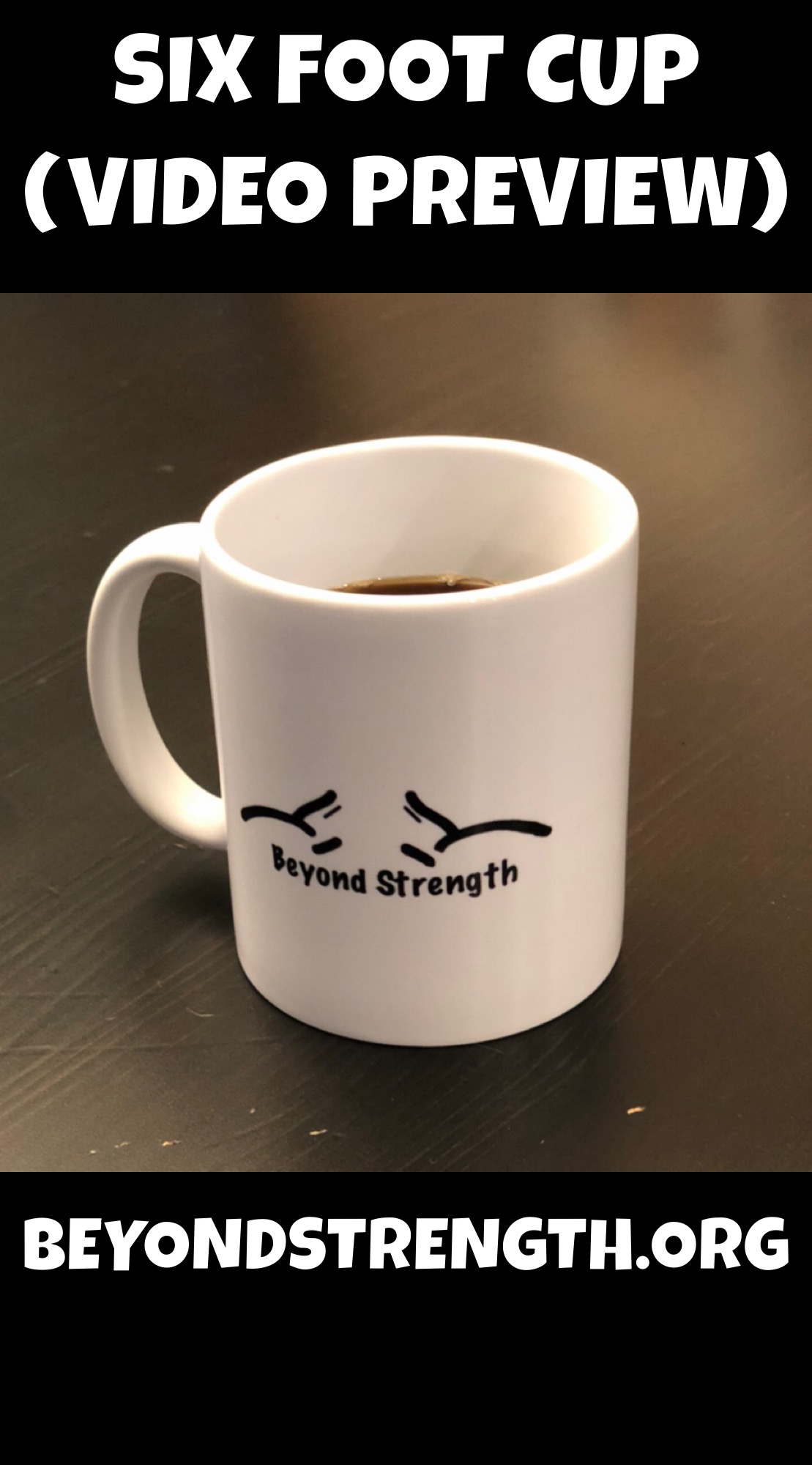
Six Foot Cup (Video Preview)

The Leadership T.R.A.P.
Think about a characteristic that makes a leader great. Now think of a person you know who exhibits that trait. What else is it about that person that sets them apart? Is it their ability to make a decision or speak their mind? Is it because they are smart, approachable, charismatic, visionary, caring, or empathetic? Do they just seem to just handle themselves (and others) well? If you work for them, is it because you know they always ‘have your back’.
I doubt any of the characteristics that came to mind had to do with managing spreadsheets or mastering tasks. Those are great situational qualities, but we are talking about leadership acumen. Probably no one came to mind because of their keen ability to boss people around, impose their will, or because they know a lot of important people.
I’ve written about all these types before, but I had a chance to summarize some of this for a recent speaking engagement. I used an acronym as my outline to quickly compare and contrast some leadership traits for that talk.
You should understand this about my history with acronyms: while I use them often to help a simple-minded man like me organize my thoughts, they can sometimes have unintended consequences.

For instance, some years ago during the challenging times surrounding Presidential Budget 2013 (PB13), I gave a leadership keynote to a large group of military members. It focused on motivating them to control what they could control, see things from a larger organizational perspective, recognize the importance of teamwork, and try to always do more than expected. A short time after that speech I received an email from one of the senior noncommissioned officers in attendance thanking me and summarizing my talk in the following acronym.
T.U.R.D.
Take an enterprising look. Understand you can only control what you can control. Relationships are key. Do more than expected.
Yep. Perhaps NOT mentioning how much I like acronyms at the start of the talk would have been good. On the plus side, his acronym actually summarized things nicely and would have saved them from listening to me blather on.
I now try to provide the acronym to audiences ahead of time!
The acronym TRAP in the title is meant to compare and contrast Task versus Relationship focused leadership (the hugging and spanking, as Jim Hunter points out), and Authority versus the Power-focused (autocratic) leader.
Tasks tend to be one-dimensional, like a checklist. Get it done, check it off. A lot of good work gets done that way. Like spanking, it may address an issue at the moment, but there is some debate whether it really ‘hurts me more than it hurts you’. When the business (task) is balanced first with relationships built on genuine care for the those accomplishing the tasks, the work still gets done (often more quickly and efficiently) while increasing people’s motivation, satisfaction, and performance. Sustained performance doesn’t increase from being bullied into submission. And the time to try building a relationship isn’t in the midst of a crisis.
Authority speaks to respect and dignity. Helping others learn, do, and be successful for the betterment of the whole. A true leader exercises authority from a position of humility, understanding their authority is ultimately derived from those whom he or she serves. It should never be wielded carelessly or recklessly from a position of power, as in the adage ‘when a hammer is your only tool, everything looks like a nail’.
Power is that hammer. “Do it or else!” I can’t help but also think of the well-used ‘Seagull Management’ analogy here: flying around making a bunch of noise, pooping on everyone, stealing their food, and then flying away while others clean up the mess.
Whether you’re reading this as a leader, follower, neither, or somewhere in between, perhaps the words of my friend, former POW Colonel Ed Hubbard, are relevant: “Everything that happens in your life is judged good or bad compared to something that has already happened.” It’s not what happens that is most important…it’s how we respond.
If you’re someone who relates and responds more to tasks and power than relationships and authority, maybe something in your past has made you that way. Or perhaps you’ve just become complacent.
Complacency had become an issue for some toward the end of my tour in Iraq. A sign on one of the bunkers we took cover in when under attack read “Complacency doesn’t kill, poor leadership does.”
Boom.
Don’t be a seagull. Be part of the solution, not part of the problem.
For more on this subject, see my related article Egos & Empires.
Get Strong. Be Strong. Stay Strong.

The Year in Review
It’s hard to believe that 20 years ago we thought Y2K would end the world or malfunctioning computers would catapult us back to the digital dark-ages. Some even believed that the turn of the century would result in some sort of Stephen King, ‘Maximum Overdrive’ scenario where machines took over the world. With the Internet of Things (IoT) led by the armies of Alexa, Cortana, Siri, and Google Assistant, we’re probably closer to that now than in 1999!
I take great care and time compiling what I hope are meaningful, enjoyable, powerful, sharable essays. Because of that, I don’t post as often as I’d prefer. Still, I feel like a kid who sank an impossible trick shot in the driveway or performed a concerto flawlessly at home, wishing more people would have witnessed it. I really want more people to read, enjoy, and relate to what I write!
So for those who missed any of my ‘life-changing’ posts in 2019 (insert eye-roll and ROFL emojis here), and in honor of the world not ending 20 years ago, here’s a Beyond Strength summary of articles from the past year.
New Beginnings: Breach the new year with optimism, commitment, and focus. Make yourself and the world a little better each day; “A compassionate man does not stand detached from the sufferings of others. Rather, he steps into the world of the hurting and feels the pain and anguish of the one suffering.” (David Jeremiah)
I’m Rubber & You’re Glue: Like a rubber band, we need to stretch to be most useful, effective, and reach our full potential.

Stretchy Pants:
S eize your moment
T ry something new
R ead
E xpect great things
T ransform your thinking
C ast no stones
H elp others reach their potential
Y our mistakes do not define you
P ain is temporary (pride is not)
A lways do more than expected
N ever fail to learn something (especially from mistakes)
T reat others the way you want them to treat you
S top giving life to the doubts of others
Friends Without Coffee: Time and distance are no indicator how close a friend really is; I am a lot more laid back when I don’t drink coffee.
Egos & Empires: Great leaders are visionary, courageous, decisive, passionate, genuine, caring, and humble; they build empires of respect, care, professionalism, and adoration. We need more leaders like that so empires of egos and self-serving motives disappear, and those who rise to prominence because they know someone (yet care about none) cease to prosper.
Discipline of Fools: Lack of self-discipline has major impact on physical, emotional, spiritual, and psychological well-being. When I fail to exercise discipline at the dinner table, my physical appearance and health suffer. When I don’t discipline my time, all areas of my life suffer. When I fail to discipline my emotions I get upset, edgy, angry, or unhappy. When I don’t discipline my thought life, my mind wanders and folly ensues.
Out with Insecurity: I trace many choices back to insecurity, damaged self-esteem, or skewed perceptions of self-worth. Sometimes you just have to turn the page to realize there is more to your book of life than the page you’re stuck on. Stop being afraid to move on! Close this chapter of hurt and never re-read it again. It’s time to get what your life deserves. Move on from things that don’t deserve you. Don’t spend your days trying to correct the past; instead, let go and let God create something better for your future.
Create Your Opportunity: Commit to a never-ending quest for learning and growth; glean value from whatever situation you face; be ready to conquer giants and overcome obstacles in life; understand you can’t do it alone. Do at least one thing better today than yesterday; relentlessly pursue whatever you love; do your best and work hard; don’t let mistakes or other people define who you are or how far you will go.

Wreckage In Your Mind: Feed the right beast. Learn from your mistakes, walk it off, and get back to work. Do not go gently into the night…“When your body gets tired, run with your heart.” (Don Denyes)
Entitlement: It’s My Prerogative: Here’s what I’m entitled to…NOTHING. But I should expect 1) Honest pay for honest work. 2) Protections outlined in the Constitution. 3) To be a good human being, because there are more than enough rotten ones.
Let Sleeping Dogs Lie: We all have a responsibility to be citizens who engage in respectful dialogue aimed at improving our world. It’s okay to disagree, but only while treating each other with dignity and respect. When tempted to be dragged into a quagmire of divisiveness or disrespect, let that sleeping dog lie.

Settle Down: Recognize how failing to address primal needs in life can cause restlessness. Embrace the present; love unreservedly; help others; determine and fulfill your purpose; live by faith knowing God is in control.
Take Off Your Mask: Patrick King says “If you want to be confident, you have to look confident.” But what if I’m not and I don’t? Many of us ‘mask’ who we are rather than risk exposing weakness or insecurity. Tear down relationship barriers by taking off your mask and allowing others to be real, without fear of criticism and judgment.
The Heart of Service: Influencing others is the heart of leadership. Some of the greatest lessons I’ve learned came from a few exceptional leaders who, through their words and actions, revealed the character of their heart and their concern for mine. That is the heart of service.
Strength is beyond just being physically strong, that’s why I called it ‘Beyond Strength‘. Let’s help each other get strong, be strong, and stay strong in this new decade.
The Leadership T.R.A.P. (Video Preview)
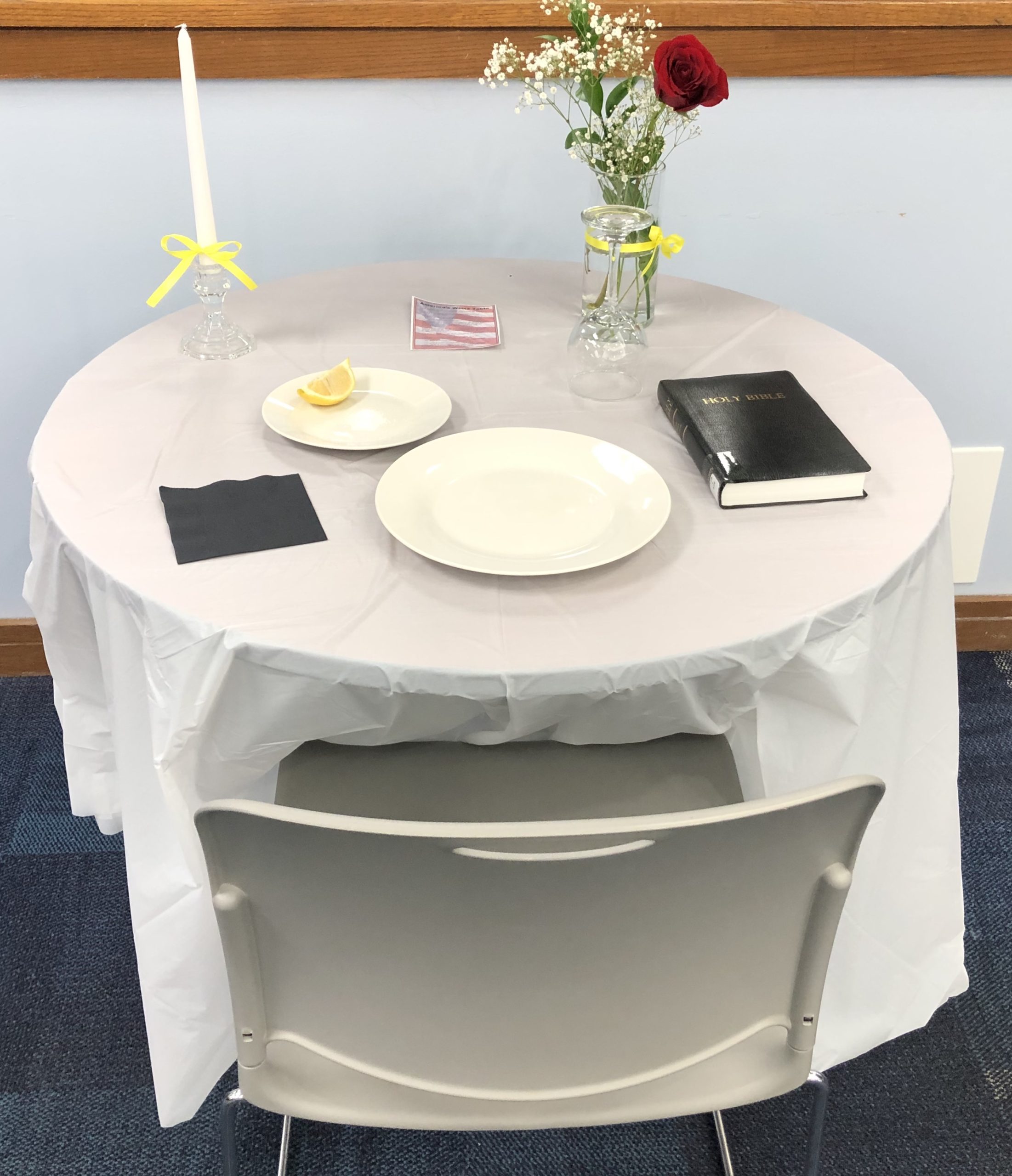
The Heart of Service
I recently had the privilege of delivering the keynote speech at two different Veterans Day events on successive evenings. While they were two very different audiences, my message was largely the same for both, with a few variations due to the nuances of each group. In each, though, I spoke about the character and heart of leadership.
While I’ve shared some similar examples before, I have come to appreciate and see with more clarity that while certain people came in and out of my life, it wasn’t simply the character of their leadership but the fundamental character of their heart that I now recognize most influenced me.
Still in the shadow of Veterans Day, let me acknowledge all of the veterans who might be reading this right now and thank you for your service to our country. Whether you served one day, one year, or an entire career, many of you made the conscious decision to volunteer your life – and many ways the lives of your families – to be part of something greater than yourself. You should be proud of that, and appreciated every day, not just on November 11th.

All who wear the uniform are pulled into service by some force, be it voluntary or compulsory. I didn’t realize it at the time, but I suspect I was at least in part drawn to military service by roots going back the revolutionary war, well documented in the four genealogy volumes my dad has published. They include:
Two WWII veteran uncles; one a soldier wounded in battle while serving in 1944 Italy, the other a sailor whose teenage son would tragically drown some 25 years later on his senior trip, never to attend one of the threemilitary academies he had been accepted to. My cousin John no doubt would have served proudly and with distinction, just like his father. Two uncles on the other side of my family, both still living in my area; one a Korean War veteran and the other a retired senior enlisted soldier. My dad a National Guard veteran; my older brother and my son, both Air Force veterans like me.
I was blessed with a very long and fulfilling military career that started in 1986. I can honestly say that through everything, I always tried hard to be the very best I could be at every level with no expectation or sense of entitlement to go to the next. I never forgot where I came from, how average I really am, and the importance of hard work. I also learned to recognize that having your head in the game is important, but it is even more important to attend the ‘heart’.
In his book The Top Ten Mistakes Leaders Make, Hans Finzel says influencing others is the heart of leadership; that the greatest impact on us as individuals comes from direct interaction with other individuals. It’s true! I never forgot the lessons I learned from a few exceptional leaders who had their head and their heart in the right place. Four leaders, in particular, through their words and actions at just the right times in my life, revealed to me the character of their heart and their concern for mine. That is the heart of leadership.
Here’s some of what I learned from these four men.
When insecure and publicly embarrassed, I learned from a Chief Master Sergeant of the Air Force that the defusing properties of humor and gratitude are powerful encouragement.
When tempted to think I was kind of a big deal, I learned from a previously feared senior enlisted leader that humility and forgiveness are two of the most respectable attributes a leader (or anyone for that matter) can have.
When dealt what seemed like a crushing blow to my career, I learned from a friend, mentor and beloved leader that failure does not define me, and well-timed encouragement and persistence can make a huge difference in a person’s life.
When cavalierly demeaned in front of others by an egomaniacal former adjutant general, I learned from a different flag officer that there is dignity, honor, and respect in standing up for others…even when the person you’re defending is a stranger.
There is nobility, strength and courage expected of those who wear the uniform and we owe veterans our gratitude, support, and recognition that not all scars are visible on the outside.
But those attributes aren’t exclusive to those who serve. When I look back over my life and career, it’s the people who influenced me and those I have influenced that I think of most – whether they wore a uniform or not.
The head is important, but the heart is the wellspring of life. That’s the heart of leadership.

Get Strong. Be Strong. Stay Strong.
Finzel, Hans. (2000). The top ten mistakes leaders make. Colorado Springs, CO: Nexgen.
